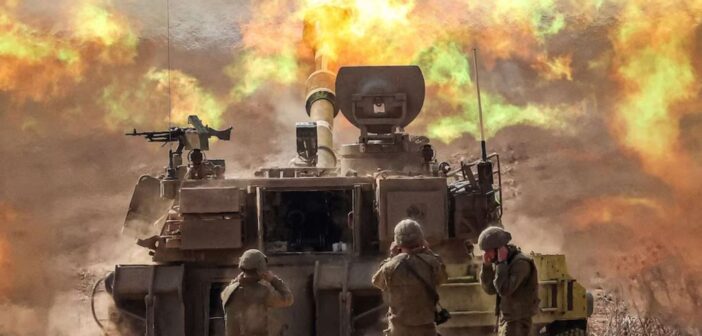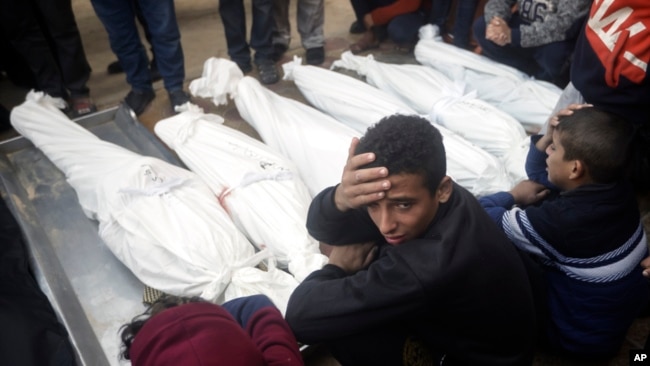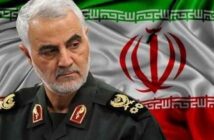Israel’s Defence Minister on Thursday announced the country’s plans for a new stage in its ongoing war in Gaza, including a more targeted strategy in the territory’s north.
“In the northern region of the Gaza strip, we will transition to a new combat approach by military achievements on the ground,” the office of Defense Minister Yoav Gallant said in a statement.
Tactics are set to include raids, demolishing tunnels, air and ground strikes, and special forces operations, Gallant said.
Israel began its military campaign to wipe out Hamas after Hamas fighters crossed into southern Israel on October 7. Israel said about 1,200 people were killed and some 240 captives taken in the terror attack. Some of the hostages have been released, with about 130 still in Gaza. Gaza health officials say more than 22,400 Palestinians, a large percentage of them women and children, have been confirmed killed in Israel’s military offensive in the Gaza Strip.
The announcement comes amid rising international pressure, including from the United States, to transition to less intense combat.
Meanwhile, Gallant said Israel will continue to try to eliminate Hamas leaders in Gaza’s south, where the majority of the territory’s 2.3 million people have been living under brutal conditions for weeks.
“It will continue for as long as is deemed necessary,” the statement said.
Under Gallant’s plan, the war in Gaza will continue until all of the hostages taken on October 7 are released, Hamas is demolished and remaining military threats are neutralized.
Once those goals are accomplished, the plan calls for a new phase to begin during which “Hamas will not control Gaza and will not pose a security threat to the citizens of Israel.” Under the plan, unspecified Palestinian entities would govern the territory.
The outline also said there would be “no Israeli civilian presence in the Gaza Strip after the goals of the war have been achieved,” but Israel would still reserve the right to operate in the territory.
Washington has suggested that a revitalized Palestinian Authority, which is based in the occupied West Bank, would govern Gaza.
U.S. Secretary of State Antony Blinken, who left for the Middle East on Thursday, will focus on how Gaza will be managed after the war, State Department spokesperson Matthew Miller told reporters.
This visit marks Blinken’s fourth visit to the region since the war began on October 7.
Blinken will also reaffirm calls for increased humanitarian aid into Gaza, the spokesperson said.
During the weeklong trip, Blinken will visit Israel and the West Bank, in addition to Turkey, Greece, Jordan, Qatar, the United Arab Emirates, Saudi Arabia and Egypt.
Earlier on Thursday, an Israeli airstrike in Gaza killed 14 people, according to the Hamas-run Gaza Health Ministry, as Israel conducted new airstrikes and ground operations against the Palestinian militant group.
The Health Ministry said the Israeli strike happened in Khan Younis, in southern Gaza, and that the dead included nine children.
Israel did not directly comment on the strike but reported carrying out an airstrike in Khan Younis that killed three militants who tried to plant a bomb. The Israeli military said its ground forces killed two other militants in a nearby building.
Israel also reported Thursday new strikes against Hezbollah targets in southern Lebanon and new cross-border rocket launches coming from Lebanon toward Israel.
The strikes came a day after Hezbollah leader Hassan Nasrallah, in a televised speech, warned Israel against attacking Lebanon.
“If the enemy thinks of waging a war on Lebanon, we will fight without restraint, without rules, without limits and without restrictions,” Nasrallah said.
His comments followed a drone strike that killed a senior Hamas official in Beirut.
Hamas and security officials in the region attributed the strike that killed Saleh al-Arouri to an Israeli drone, although Israel has not directly acknowledged responsibility.
The chief of Israel’s Mossad intelligence service, David Barnea, said Wednesday the agency would hunt down every Hamas member involved in the October 7 attack on Israel, no matter where they are.
Hezbollah — like Hamas, an Iran-backed militant group designated as a terror organization by the United States — has been firing rockets across Israel’s northern border since the Israel-Hamas war broke out in October.
Some material for this report came from The Associated Press, Agence France-Presse and Reuters.




